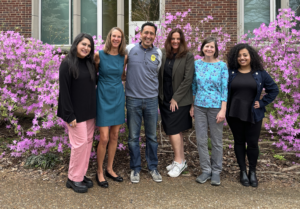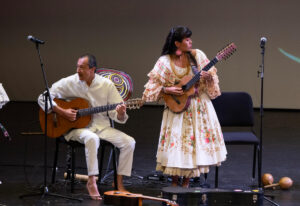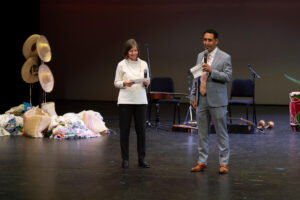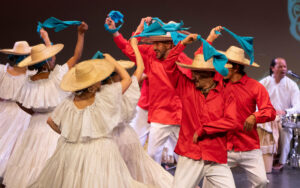CLACX: A legacy and future of leadership and evolution
For more than 75 years, Vanderbilt has been a pioneer in the study of the Americas, forging new paths to innovate, shape, and advance the field. Now, the Center for Latin American, Caribbean, and Latinx Studies (CLACX) once again finds itself at the forefront, driving important changes in education, research, and programming, both at the university and across the country.
“The center has been a thought leader for decades, starting with a focus on Brazilian studies in the 1940s, then deepening research on developmental economics in Latin America in the 1960s and 70s, and more recently expanding into Guatemalan studies,” said Celso Castilho, CLACX director and associate professor of history. “Now, we find ourselves leading again, as we combine Latin American, Latinx, and Caribbean studies into one cohesive curriculum and research agenda that reflects important shifts in higher education as well as broader social changes across the U.S.”
Redefining the field
The Hispanic population in the United States is growing rapidly. In 2023, the U.S. Census Bureau reported that 19.1 percent (63.7 million people) of the country’s population was Hispanic—an 18 percent increase since 2013. The Vanderbilt campus has seen similar growth, with 11.9 percent of the student body identifying as Hispanic, up from 7.9 percent a decade ago.

“We’re in a moment now where the diasporic population is as large as it ever has been,” said Castilho. “This necessitates that we fundamentally change our methods, moving away from a U.S.-centered approach to a more global approach.”
Historically, Latin American studies (the study of Latin America and the Caribbean) and Latinx studies (the study of Latino and Latina people in the U.S.) have been distinct and unconnected.
“In the past, the framework for study has been built on geographic borders and the political constructs at the time,” said Gretchen Selcke, assistant director of CLACX and senior lecturer of Latino and Latina studies. “But instead of insisting on these artificial borders, which no longer apply due to the diaspora, we are embracing the idea that these fields have to be in conversation with one another in an intentional way.”

CLACX is working to combine the existing majors in Latin American studies and in Latino and Latina studies into one, new, comprehensive major: Latin American, Caribbean, and Latinx studies. CLACX plans to launch the new major in fall 2025. Selcke said that Vanderbilt is unique in this approach because the prospect of combining these academic programs is not a conversation most institutions are having in a meaningful way.
“It’s now impossible to talk about this hemisphere without talking about all these things together,” said Selcke. “These fields have to be in conversation with each other, because people, products, and cultures are crossing these borders all the time, and have been, arguably, since the 15th century.”
In February 2024, Castilho and Sara Kozameh, a former postdoctoral fellow at CLACX and now assistant professor of history at the University of California-San Diego, published an essay in Perspectives on History that pushes the conversation further. They researched tenure-stream job ads that called for expertise in both Latin American and Latino history—a skill set lacking in trained scholars because of the longstanding division between the two academic sectors. The article pointed to the need to train graduate students across both fields to address this new demand.
Shaping the national conversation
CLACX is building a 21st century articulation of Latin American studies that intertwines the history, cultures, and languages of Hispanic people in Latin America and in the U.S. They’re shaping the conversation not just through academic articles, but also through in-person programming and discussions.

A recent U.S. Department of Education grant reestablished CLACX as one of just 19 designated National Resource Centers for Latin American Studies in the country, a status it’s held since 2006.
In 2022, supported by the grant, CLACX founded the Consortium for Latin American Studies in the South, creating a collaborative network of regional Minority Serving Institutions. The consortium, which meets annually, fosters connections between the institutions and serves as a hub to discuss and reimagine the nature and future of Latin American studies in the South.
“We created the consortium to address and discuss the nature of Latin American studies and its relationship and integration with Latinx studies, specifically in the Southeastern U.S.,” said Avery Dickins de Girón, executive director of CLACX and senior lecturer of Latin American studies. “The consortium allows us to have conversations about these issues from different institutional perspectives.”
The group includes Vanderbilt, Tuskegee University, University of Texas-Arlington, Tennessee State University, Jacksonville State University, and The University of Alabama.
“The consortium not only helps us rethink the future of Latin American and Latino studies in the South, but it also helps to shape and expand curricular opportunities,” said Castilho.
In addition, Castilho was recently elected president of The Conference on Latin American History, an organization that encourages the diffusion of knowledge about Latin America through fostering the study and improving the teaching of Latin American history.
“This opportunity allows me to invite more self-reflection about Latin American history in our current times, as we see a historically large Latin American diaspora in the U.S. and globally,” said Castilho. “These connections to Latino studies are at the heart of our objectives at CLACX, and it’s exciting to place our work in these larger conversations happening in higher education.”
Impact at Vanderbilt and beyond
CLACX is transforming programming and academics on campus through valuable trans-institutional partnerships. The center routinely partners with the Blair School of Music to encourage international exchanges between faculty and Latin American musical conductors. This effort has helped strengthen programs and courses related to Latin American musical genres at Blair, including performance residencies and master classes.
CLACX also provides support to School of Engineering faculty who travel with students to Guatemala, where the students repair machinery in hospitals and work on sustainability projects, as well as other faculty-led student experiences abroad.

Through the U.S. Department of Education Foreign Language and Area Studies Fellowships Program, the center supports students studying Portuguese and K’iche’ Mayan, making Vanderbilt one of the few universities where it’s possible to study the latter.
CLACX has also established a new Student Advisory Board, giving students the opportunity to provide valuable feedback, make connections with one another, shape activities, and ultimately strengthen and solidify the Latinx undergraduate academic community on campus.
Locally, the center has longstanding partnerships with the Frist Art Museum, Cheekwood Estate and Gardens, and Metro Nashville Public Schools, supporting a wide variety of Latin American and Latinx programming with each.
The center also partners closely with ReadWorks, a nonprofit that seeks to improve reading comprehension across the U.S. CLACX has supported a range of projects, including staff and graduate students creating content for their “Article a Day” series for grades 4-8; graduate students translating English language texts into Spanish; and undergraduates creating original Spanish language texts for high-poverty K-8 schools with a large number of English Language Learners. Since the partnership began in 2017, more than 210,244 teachers in 60,032 schools nationwide have used content produced by CLACX.
“Over the last two decades since its designation as a National Resource Center, the center has made a significant impact at the local and national levels through its programming for K-16 educators, students, and the general public,” said Dickins de Girón.
On an international scale, CLACX and the library have intentionally developed a program to amplify the underrepresented voices of Indigenous and Afro-Hispanic populations through preserving and digitizing Vanderbilt’s rare Colombian collections so that they are openly accessible.
Building on 75 years
The Center for Latin American, Caribbean, and Latinx Studies has a long history at Vanderbilt, beginning with the inception of the Institute for Brazilian Studies in the 1940s. The program expanded its focus in the 1960s to include Latin America and was renamed the Center for Latin American Studies. In 2021, the center merged with the Latino and Latina studies program, added the Caribbean as an area of study, and adopted its current name.
Dickins de Girón was awarded a Sesquicentennial Grant in 2023 to further investigate and document the center’s history. “Somos VU: Bringing Together Student Organizations, Alumni, and the Institutional History of CLACX” will include a digital photo archive and narrative timeline and is expected to be completed this year.
“CLACX’s impact on our campus and on the field more broadly cannot be understated,” said Timothy P. McNamara, interim dean of the College of Arts and Science. “They continue to critically explore new ways to understand, research, and teach Latin American studies, reaching across traditional disciplinary boundaries to broaden our perspectives in critical ways.”
To honor more than 75 years of innovation and impact, CLACX is hosting an event on April 11 to look at the past, present, and future of Latin American and Latinx studies at Vanderbilt and beyond. The event will include a roundtable discussion with faculty, alumni, and current students from 3-4:30 p.m. in the Central Library Community Room, followed by a reception. The event is free and open to the public.
